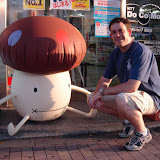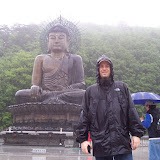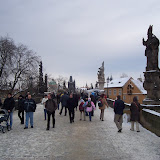I Live There!
"Opposition-led protests over the election results spread on March 16. Protesters occupied government buildings in the Kochkor District in eastern Naryn Province and in the Bazarkorgon District of southern Jalal-Abad Province...In the Bazarkorgon incident, a district government official was reportedly being held in the building. Police later broke through a window in the building, freeing the official... "
Eurasianet.com article, 3-16-05
That's right. Our governor was effectively held hostage by protestors half a mile from my apartment in the government building I walk past everyday on my way to school. The police that rescued the official were actually special forces militia, who have begun patroling the streets wearing their trademark army fatigues and bullet-proof vests. SHIT IS HITTING THE FAN HERE! Not content to only protest in Jalalabat, 50-100 protestors have moved to my village to speak out against Askar Akaev. They are peaceful (but really should stop singing, its annoying) and no serious incidents have occured (aside from the semi-kidnapping thing). I have heard stories of protestors being injured in Osh, a two hour drive from my site. I really have to start questioning Peace Corps policy if they think we are safer spread around the country instead of being consolodated together in the capital...
So with everything going on, rumors are flying. The possibility of being evacuated from the country has been tossed around. With protests now and presidential and parlimentary elections scheduled for October, the chances of us being yanked out of here isn't too farfetched. We'll see... Now I have to head back to the bazaar to catch a taxi. It's just a ten minute walk but the militia members in full riot gear that I have to stroll past are becoming a bit disconcerting.
Eurasianet.com article, 3-16-05
That's right. Our governor was effectively held hostage by protestors half a mile from my apartment in the government building I walk past everyday on my way to school. The police that rescued the official were actually special forces militia, who have begun patroling the streets wearing their trademark army fatigues and bullet-proof vests. SHIT IS HITTING THE FAN HERE! Not content to only protest in Jalalabat, 50-100 protestors have moved to my village to speak out against Askar Akaev. They are peaceful (but really should stop singing, its annoying) and no serious incidents have occured (aside from the semi-kidnapping thing). I have heard stories of protestors being injured in Osh, a two hour drive from my site. I really have to start questioning Peace Corps policy if they think we are safer spread around the country instead of being consolodated together in the capital...
So with everything going on, rumors are flying. The possibility of being evacuated from the country has been tossed around. With protests now and presidential and parlimentary elections scheduled for October, the chances of us being yanked out of here isn't too farfetched. We'll see... Now I have to head back to the bazaar to catch a taxi. It's just a ten minute walk but the militia members in full riot gear that I have to stroll past are becoming a bit disconcerting.









7 comments:
You are officially a tool. This is what I think and you can't make me take it back.
Sean,
this stuff is so crazy man. you should try and get some pics of the protests or maybe even join in one (but be towards the back, or on second thought, maybe don't join in the protest).
anyway, glad to hear you're safe and getting the full abroad experience
I doubt they'll pull you. In Togo they did'nt and the country agreement was no longer valid.
There is a cool Vanity Fair article out from a PCV in Togo.
They won't talk about Togos and everyone is screaming CIA.
Hey man, I've just discovered all these blogs and am hoping for the best for you guys. I hope you don't get evacuated b/c it is a very shitty transition and b/c I do love B-K. Are you working at the boarding school with Alisher? You apartment looked very familiar (from your pics). I worked at the Babur School for 2 yrs, then at Osh Too until 9/11. I'm really concerned about the Uzbek-Krygyz relations. How are they holding up? I've seen it mentioned rarely in the media. Any info ont hat would be greatly appreciated by Fergana alumni. Thanks, and enjoy it while it lasts. Good luck.
It is now March 26 and all these PCVs have nothing to say? A revolution and no blogging? All the deals ya', make here never really work out, really!
I think the Uz thing is not really a concern because of the Russian school problem. I don't think they'll go nuts again over a couple of leaders from Kyryg.
Oh ya, its not like Russia was joining the Stan thing at the time and someone scared everybody by saying EU.
Uzbekistan and Kyrygistan will probably see little difference in leaders. The US has always preffered a dictator instead of an Islamist revolution and the cycle these leaders go through is Iraq's Saddam. They are installed by the US, used, and thrown out at a later date. I don't see any 'Democratic'(unless you include strongmen like Saddam) leader rising out of this mess.
I think Rice's reaffirmation of liberating countries today and creating democracies - the mention of Kyrygistan does not lead me to beleive the PCVs should not have been evacuated a long time ago. The goernemt no longer exists and PC has no agreement to have the PCVs in country, other than justifying the classifed employees at OSS(Office of Safety and Security-classified to avoid the five year employee rotation rule)and using events like this to keep them on over five years at the agency. When the PCVs are classified, the same excuse just goes on further to justify funding decisions made without Congressional approval-like the existence of the OSS becuase PCV cases go well beyond five years.......
Revolts in former Soviet republics being felt in Russia
Fri Mar 25, 5:09 PM ET Top Stories - Knight Ridder Newspapers
By Mark McDonald, Knight Ridder Newspapers
MOSCOW - With far-off Kyrgyzstan in revolt Friday, senior Russian politicians and pro-government analysts voiced concerns for the first time that populist revolutions in the former Soviet Union hold ominous portents for Russia's prestige, stability and security.
• Some Russians fear regional instability
• Around the world
• FDA approves once-a-month drug plan for osteoporosis
• Another legal setback for Schiavo's parents
• Parents Won't Give Up
AFP
Slideshow: Kyrgyzstan Unrest
Echo Company
Knight Ridder Special Report (at philly.com)
"The impact will be bad," said Sergei Markov, one of the architects of President Vladimir Putin (news - web sites)'s quasi-authoritarian policy of "managed democracy."
"The Central Asian region now faces a risk of Islamization," Markov said. "In addition, drug trafficking from Central Asia to Europe via Russia will certainly grow."
Whether democratic fever will spread to Russia eventually is the larger question.
A liberal opposition leader, Boris Nemtsov, suggested Friday that "if President Putin at least draws some lessons from these revolutions, Russia can avoid such a scenario.
"And if he doesn't, then anything is possible."
The Kyrgyz uprising is the third pro-democracy revolt in the former Soviet Union in the past 18 months, following Georgia's Rose Revolution and Ukraine's Orange Revolution.
Although Kyrgyzstan is a former Soviet republic that inherited a Soviet-style strongman as its leader, the country is markedly different from Georgia and Ukraine: It's landlocked, Asian, predominantly (and moderately) Muslim, with an almost feudal economy and no history of pluralism or liberal democracy.
Its revolution has been different, too: bloody, spontaneous, disorganized, marred by looting. The sobriquet "Velvet Revolution" (Czechoslovakia, 1989) doesn't quite fit.
Still, many Russian analysts were seeing Kyrgyzstan as the latest post-Soviet domino to fall, tipped over precisely by the earlier uprisings in Eastern Europe.
Vyacheslav Nikonov, the director of the Politika Foundation, a well-regarded Moscow research center, called the Kyrgyz revolt "undoubtedly the same sort of event as in Georgia and Ukraine."
There was some evidence Friday that organizers from Georgia had been working with the Kyrgyz opposition before the uprising, just as they had in Ukraine, but other pro-democracy activists who work in the region were worried by the violence they saw.
Rather than a well-orchestrated, almost festive political event with continuous back-channel negotiations with the regime, the Kyrgyz protest quickly and unexpectedly boiled over, fueled by public anger over poverty, corruption and a lack of jobs.
The violence could well embolden protesters elsewhere in Central Asia, and activists feared that such protests would be met by harsh crackdowns by the regimes there, possibly including the expulsion of Western pro-democracy groups.
Nikonov said gas-rich Kazakhstan, another Central Asian nation with an authoritarian regime, probably would be "the next link in the chain," partly because of the active presence there of international groups and Western nongovernmental organizations.
Regional analysts said Uzbekistan, ruled by the dictator Islam Karimov, was another possible candidate for revolution.
Despite its brutal, totalitarian government, Uzbekistan remains a close ally of the United States because of a large and strategic American air base in the southern part of the country. Karimov allowed U.S. forces to take over the base before the war in Afghanistan (news - web sites).
His security forces quickly crush any sort of opposition to his regime, particularly if it has an Islamic tinge.
A Knight Ridder investigation in Uzbekistan last year found numerous cases of police torture and abuse. One detainee died in police custody when he was allegedly dipped in a vat of boiling water. Another man said he was questioned by a syringe-wielding police investigator who threatened to inject him with the HIV virus (news - web sites), which causes AIDS (news - web sites).
Closer to Moscow, a crowd of about 1,000 demonstrators gathered Friday in downtown Minsk, the capital of Belarus, the former Soviet republic ruled by Alexander Lukashenko. He's often derided as "the last dictator in Europe."
Police quickly broke up the rally and arrested about a dozen people.
Russian nationalists called Friday for harsh measures against Kyrgyzstan, even as Kyrgyz opposition leaders scheduled new elections in June to replace the tainted March 13 vote that sparked the uprising.
The flamboyant leader of the Liberal Democratic Party of Russia, Vladimir Zhirinovsky, called the Kyrgyz revolutionaries "scum" and said Russia should "suppress the mutiny of the vulgar mob" that ousted Moscow's friend, President Askar Akayev.
"If we don't do this now," he said in an interview on Ekho Moskvy radio, "the infection will spread throughout Central Asia."
Maybe they'll have room for you guys here. Not that the OSS is NOT hiring and it is, afterall, a good 20 years outside the five year rotation rule at Peace Corps(okay, so you have to be classified to work there over five years, and yes, the 'study' due out soon from a Congressional Bill will probably eliminate the five year rule) Still stuck in Kyryg or have they decided to send you home?
I assume Anne is'nt related to Director Gearan!
State Dept. Sets Up Postwar Cleanup Office
Wed Mar 23, 6:21 PM ET White House - AP Cabinet & State
By ANNE GEARAN, AP Diplomatic Writer
WASHINGTON - As nearly two years of insurgent attacks and intermittent electricity attest in Iraq (news - web sites), the hard work of war isn't over when the shooting stops. The State Department has set up a new office to manage the aftermath of war and try to prevent extremism from taking hold in desperate places.
"It's not just strong states we need to be concerned with," Undersecretary of State Nicholas Burns said Wednesday. "It's weak states and failed states and failing states."
Hopeless and poor countries are breeding grounds for terrorists like the Sept. 11 hijackers, Burns said.
Since the attacks in New York and Washington, the United States has helped topple the militant Taliban government in Afghanistan (news - web sites) and is now overseeing rebuilding efforts there, and overthrew Saddam Hussein (news - web sites)'s dictatorship in Iraq.
The mission statement for the State Department's new office of reconstruction and stabilization says it is to "lead, coordinate, and institutionalize U.S. government civilian capacity to prevent or prepare for post-conflict situations, and to help stabilize and reconstruct societies in transition from conflict or civil strife...."
The Bush administration has asked Congress for an emergency $17 million to get the office running and has named a director, former Ambassador to Ukraine Carlos Pascual.
"We have seen how states where chaos and corruption and cruelty reign pose a threat to our neighbors, but also to us," Secretary of State Condoleezza Rice (news - web sites) said in Senate testimony on the budget request last month.
Burns, most recently U.S. ambassador to NATO (news - web sites), noted that the United Nations (news - web sites) has mounted 41 peacekeeping missions since the end of the Cold War. Many could have benefited from help coordinating non-governmental, military and other aid, Burns said.
"It's everything we didn't have in Bosnia in 1995," Burns said at a conference on rebuilding war-torn states hosted by the private Institute for Peace.
Pasqual also addressed the group Wednesday.
The Bush administration wants $124 million for the office next year.
Post a Comment